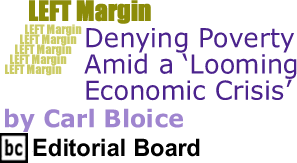
|
|||||||||||||||||||||
|
||||||||||
|
The current issue is always free to everyone If
you need the access available to a |
||||||||||
 |
||||||||||
 |
||||||||||
A very strange article appeared July 19th in a major German news magazine. A harsh, front�page attack on a U.S. Presidential candidate in a publication like Der Spiegel is probably unprecedented, but there it was - Obama Unplugged� by Gabor Steingart. He is the author of A Causality of Globalization: The Death of Unions, that is also a section of his book World War for Wealth: The Global Grab for Power and Prosperity. He heads the magazine�s Washington office. Steingart�s blast was not criticism from a progressive quarter for Obama�s fence sitting - and sometimes-backward positions - on a number of important questions. It was a reflection of a vigorous campaign being waged by conservatives, neo-conservatives and the like against some critical ideas and aspirations of an emerging progressive majority of the people in the U.S. "Obama," wrote Steingart, �does exactly what populists like to do most: He compares apples and oranges. A kids� project in Harlem that he would like to see extended across America costs $46 million a year -- the kind of money that is spent in just one morning in the Iraq war, he says. Let's invest this money better, he calls out to the audience. The applause speaks for the effectiveness of these kinds of comparisons. But it also speaks against the candidate. Buying toys instead of weapons is the surest way for America to lose its status as a superpower. The conflict with an aggressive Islam could not be won in this way.� �Naturally Obama knows this -- that's why in an article for Foreign Affairs he writes that in his opinion the US military urgently needs to be 'revitalized.'" That means more money, more soldiers and more ground forces -- he suggests an increase of around 100,000 men and women. "A strong military is, more than anything, necessary to sustain peace," he writes." But Foreign Affairs is hardly daily reading in America's poorest neighborhoods. The lack of education bemoaned by Obama, the social policy specialist, renders valuable services to Obama, the foreign policy expert.� (Here Steingart has a point. Shades of President Johnson�s �guns and butter;� some of Obama�s foreign policy views are indeed out of sync with our domestic needs). Obama �proceeds on the basis that no one in the audience is capable of mental arithmetic,� writes Steingart. �After all, if his speech became government policy tomorrow, then the new president would have to head straight to the International Monetary Fund the next day to ask for a loan. Obama is demanding what the Republicans call �big government,� a free-spending state. He promises to bring in socialized medicine without mentioning how he will finance it. He wants to found an American bank for the poor, based on the concept of the World Bank, he wants to give money to after-school centers and transform the minimum wage into a real living wage, which would automatically increase with any rise in inflation.� This, Steingart suggests, would only devalue the dollar.
Steingart, who has described low-income German workers as �white trash� believes �the main thing that sets the modern poor apart from the industrial age pauper is a sheer lack of interest in education.� He is partial to German Chancellor Andrea Merkel who he says has �taken the country back to where it belongs -- at America's side� and who he sees as closer politically to Senator Hilary Clinton than to the Republicans. He says that Merkel hasn�t met with Clinton because she avoids interfering in U.S. international politics � something about which he clearly has no qualms. The senator from Illinois is not neocon Steingart�s real target. Obama is only his foil for expressing his alarm at the way some issues are emerging in U.S. politics. Enter Linda Chavez. �Barack Obama and John Edwards want to get us out of one war and into another,� she wrote in mid-July on Town Hall, a right wing website. "The two Democrats vying for their party's presidential nomination want to end the war in Iraq and spend at least some of the savings on a new war on poverty.� �Ending poverty is certainly a noble goal -- but from the policy proposals Obama and Edwards offered, it appears neither has a clue about how to go about it,� writes Chavez, a one-time American Federation of Teachers union official. �These men want more government spending, as if adding a few billion more to the $11 trillion that has been spent on poverty programs since President Lyndon Johnson first initiated the War on Poverty in 1964 would finally produce the desired results. Worse, some of the proposals they offered would likely harm poor families, not help them.� �Obama wants to tie the minimum wage to the Consumer Price Index, which would price the lowest-skilled workers, especially young blacks, out of the job market, not to mention increase inflationary pressure on wages,� writes Chavez, a strident opponent of affirmative action. �Edwards would have the government create 1 million new temporary jobs for the chronically unemployed, despite abundant research that shows these programs have no lasting impact in reducing poverty or increasing long-term employment among the poor.� (There is no credible evidence to support either of these right wing canards.)
��In a nation as rich as ours,� argue Obama and Edwards, �one-in-ten American families living in poverty is simply unacceptable,� I agree, but the numbers reveal a lot more complexity than either man is willing to acknowledge,� she writes. What are the sources of poverty in the country according to Chavez?� Immigration (both �legal and illegal�) and �family breakdown� - specifically African American families. �So why aren't Obama and Edwards talking more about marriage as an antidote to poverty?� asks Chavez. �From all accounts, both men have wonderful, even inspirational, marriages of their own. But many Democrats are worried they might not seem inclusive or might even be viewed as intolerant if they talk up marriage.� �It's a lot easier to offer to increase government spending. My suspicion is, however, that most Americans understand that the War on Poverty won't be won by throwing their tax dollars behind more failed programs.� Chavez concludes. It is �so hard to tackle concentrated poverty,� whined David Brooks in the New York Times, July 20th. His location for the origins of poverty? How about genes and brain tissue? �Human beings are permeable,� writes Brooks. �The habits that are common in underclass areas get inside the brains of those who grow up there and undermine long-range thinking and social trust. It illuminates the dangers of believing that there is a universal hunger for liberty. That universal hunger may exist in the abstract, but we�re embedded creatures and the way specific individuals perceive liberty depends on context.� That may sound like gibberish; Brooks� writing increasingly does. However, there is method to all this. As with Steingart and Chavez, the aim here is to remove poverty as an issue in U.S. political life. To my mind, what is desired is to eliminate economics from our political consideration altogether. �In the 19th century, Marx said that people were organized according to their material interests and their relationship to the means of production,� writes Brooks. Actually, that is a perversion of what ole Karl had to say. But that doesn�t matter. The aim here is to make us think that �material interest� isn�t really important at all. �In the information age, it seems fitting that we�d see people bonded by communication,� asserts Brooks. �It�s not exactly new to say that no man is an island. But Hofstadter is one of hundreds of scientists and scholars showing how interconnectedness actually works. What�s being described is a vast web of information � some contained in genes, some in brain structure, some in the flow of dinner conversation � that joins us to our ancestors and reminds the living of the presence of the dead.� That may sound like gibberish; but as I said Brooks� writing increasingly does.
The racist or social Darwinist implications of the attack I�m describing are hardly camouflaged. What has some people up in arms is the increasing awareness that poverty is growing in the country, that there are ever widening income disparities, that there is growing recognition that this is all somehow connected to globalization and capitalism run amuck, and that polls that indicate most people in our country think the government is not doing enough to tackle poverty. And, it�s not just poverty. Over the past year it has become obvious that the �experts� were consistently wrong about the seriousness of the situation in the housing business. There were repeated, sanguine assurances that the sub-prime mortgage trouble would not spread beyond the people with such loans who are facing foreclosures and that there was no danger of the troubles spilling over into the larger economy. What was only a few weeks ago described as �the sub-prime mortgage mess� is now being referred to in some quarters as reflecting a �teetering market� and a �looming financial crisis.� The consensus amongst mainline economists seems to be that the worst is yet to come.� There are frequent comparisons these days between the situation we face today and that on the eve of the Great Depression. It�s a good time to recall what actually arose after 1929. Yes, the stock market crashed and I�m told some stockbrokers jumped out windows. But, also millions of people lost their jobs, were evicted from their dwellings, had their utilities shut off and suffered in many other ways. I�ll leave it to the economists to say whether the current crisis will deepen and how bad things might get. But there is a lot of insecurity out there - and a lot of hurt. We�re in an election cycle and it ill serves working people and people of color to let their interests or concerns be denied or swept under the rug. BlackCommentator.com Editorial Board member Carl Bloice is a writer in San Francisco, a member of the National Coordinating Committee of the Committees of Correspondence for Democracy and Socialism and formerly worked for a healthcare union. Click here to contact Mr. Bloice. |
||||||||||
| August
2, 2007 Issue 240 |
|
| Printer Friendly Version in resizeable plain text format format |
 |
 |
 |
| |
| |


































